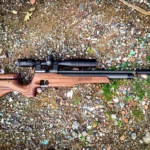A 33.24-kilogram lake trout.
A greenish-grayish speckled whopper the weight of a golden retriever.
That’s a big fish.
And that’s the fish that Scott Enloe reeled in from the Blue Mesa Reservoir, a man-made lake in Colorado, last week.
Enloe’s catch poses a challenge to the record set by angler Lloyd Bull, who pulled a 32.6-kilogram lake trout from waters in the Northwest Territories in 1995.
“It’s obviously the largest one I’ve ever seen,” Enloe said of his remarkable haul.
“It was exactly 47 inches long and it had a 37-inch girth … I’m a 35-inch waist and it was bigger than me.”
Table of Contents
Catch may not officially break record
But Enloe’s catch may not make it into the International Game Fish Association’s (IGFA) record books, where Bull holds the top lake trout spot.
That’s because the organization requires that fish be weighed on land.
Enloe weighed, measured and photographed his fish on his boat — and then he let it go.
“Whether I get my name in the books or not, that’s irrelevant to me,” he said. “I was not going to kill the fish regardless.”
Zac Bellapigna, angler recognition coordinator for the IGFA, said Enloe wouldn’t have had to kill his trout, necessarily. Fishers can bring their fish to shore, weigh them, and release them alive.
“I commend him for releasing the fish alive, that’s a good thing,” said Bellapigna.
‘One of the best fishing spots in the world’
About 3,000 kilometres north of the Blue Mesa Reservoir sits the majestic Great Bear Lake, site of an Indigenous-led UNESCO-recognized biosphere reserve. It’s known for producing some of the biggest lake trout ever caught.
“Growing up, we caught a lot of pretty big trout,” said Naokah Bailes, who was raised in the Sahtu region and has been fishing in Great Bear Lake since she was small.
“Little did I know I was actually fishing at probably one of the best fishing spots in the world.”
The people who know Great Bear Lake, or who’ve visited, give many reasons for why the lake is a unique place to cast a line.
For one, it’s huge — one of the world’s largest — and there’s only one community on its shores: Délı̨nę, which has a population of a little over 600.
“It’s such a small community, right?” said Bailes. “Even if someone’s out there fishing all day, the lake is so big we would never have an actual impact on the fish populations.”
Even bigger fish netted in Great Bear Lake in 2009
Ask people in the Délı̨nę about fish, and one name comes up again and again: George Kenny.
Kenny netted a lake trout from Great Bear topping 38 kilograms in 2009.
That fish didn’t survive, and it’s now memorialized in the community’s Great Bear Lodge.
“There’s something about the genetics, also, in Great Bear Lake that produces very large fish,” said Mike Bryant, who once penned a column as the “Fishin’ Technician” and is now the group publisher for Northern News Services in Yellowknife.
Not all its trout grow to “super sizes,” he said, but a strain of them do.
Bryant, who visited the lake in 1997 and plans to return this summer, pointed out that a good chunk of IGFA’s lake trout line class records have been set at Great Bear Lake.
“Great Bear Lake is like an aquarium. It’s full of fish,” said Danny Gaudet, Ɂekw’ahtide (leader) of the Deline Got’ine government.
Gaudet also fishes — but for food, not trophies.
There’s nothing that compares to the meat on a Great Bear Lake fish, he said, and you’re always guaranteed to catch one.
Gaudet said that if more tourists travel to Great Bear Lake for fishing, and fish in a sustainable way, it could benefit the community’s economy.
It’s one reason why he says he’s actually happy for Scott Enloe, because big catches like that draw in tourism.
“If it sustains that economy for them, that’s great,” he said. “Of course, we’re from Great Bear Lake and we will break the record again.”








































